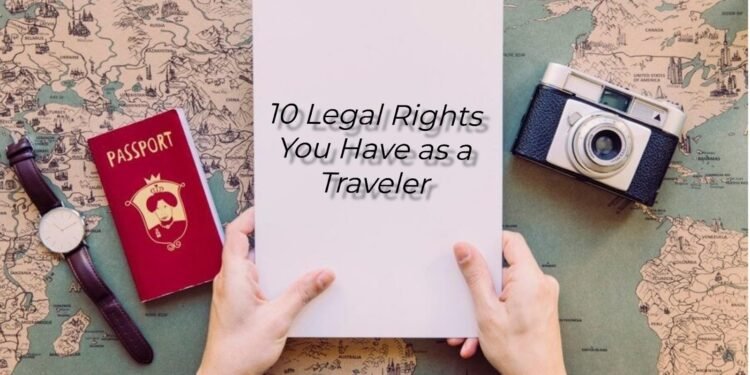Do you know that the right to travel is a constitutionally recognized fundamental freedom in the United States? As described in legal debates available in this resource, such a right entails a host of various legal protections bestowed upon all aspects of travel. More than ever, in an increasingly interdependent world, traveling from door to door not only warrants a proper understanding of one’s civil rights but also concerns other issues arising while traveling.
It will explore ten crucial legal rights of tourists that each traveler must know to provide some practical insights and examples to help you navigate better the possible challenges. With this knowledge, you can be more confident and at peace on your journeys.
Travel opens up a world of adventure, culture, and experiences. However, sometimes challenges may come your way ranging from cancellations to safety concerns. This is what makes the legal rights you have as a traveler crucial in navigating these situations. Here are ten essential rights you should know about with examples illustrating each one.
1. Right to Safe Travel
Every traveler has the right to reasonable safety while traveling, whether by public transportation, in a hotel, or on an organized tour. That is to say, transport operators and service providers need to fulfill safety standards.
Additionally, ensuring you have reliable communication while traveling can be vital for your safety. Consider using an esim usa prepaid plan to stay connected in case of emergencies.
Example: You are on a coach tour and, on reaching the destination, you find that the vehicle has been spotted to have safety infractions, such as faulty brakes. You can cancel the trip and get a refund. Similarly, in a flight that could not leave due to the heavy weather conditions, airlines are supposed to communicate with you and cater to your needs like food, and shelter, until you can safely travel.
2. Right to Information
A traveler needs to know clearly and accurately where he or she is going, whether it’s the status of his or her flight or accommodation policies and local laws.
Example: If a flight is delayed, the airline is obligated to communicate to the customer why it was delayed and what his rebooking or refunding options were. If you book through an agency, they have the responsibility to explain various pertinent details like the cancellation policies of travel and extra costs associated with the mode of travel to such an extent that you’re fully informed about your commitment.
3. Right to Accessibility
Travelers with disabilities have specific rights to ensure that they can enjoy their travel experiences fully and independently. This encompasses accessible transportation, hotel accommodations, and attractions.
Example: If you require a wheelchair, airports, and airlines are required to assist, such as a wheelchair, and help with boarding. Similarly, hotels must ensure that their facilities are compliant with accessibility laws, offering features like grab bars in bathrooms and rooms that can accommodate wheelchairs.
4. Right to Privacy
You would have privacy while traveling, especially as concerns the treatment of information by airlines, hotels, and tour operators.
For example: When you book your accommodation in a hotel, the hotel cannot pass your data, like your name or payment details, to third parties before your consent. In case an airline is processing personal data on the travels of passengers, they must secure it and also disclose to people how it will be used by complying with data protection laws such as GDPR in Europe.
5. Right to Compensation for Delays and Cancellations
The airline may pay you back if you get delayed or your flight gets canceled, as a result of which the rules vary based on the policies enforced by carriers and prevailing laws at the destinations.
Example: AirHelp legislation provides an example whereby if your flight, because an airline failed in its duty of care, is delayed by more than three hours, then you would be entitled to compensation from €300 to €600 depending on the distance traveled. While the federal regulation is different in the United States, many airlines choose to compensate travelers for major delays such as through a voucher or rebooking.
6. Right to Fair Treatment
The tourist shall, therefore, have all rights to fair and equitable treatment without discrimination of any kind, including race, gender, nationality, or any other status.
Example: If a hotel refuses to give you a room due to your race, or gender, then that is discrimination. You can report the issue to the concerned regulatory body, and such an incident may result in heavy penalties for the offending establishment. Similarly, if you feel harassed by any public transport official, you may file the matter and approach the appropriate authorities to seek redress.
7. Right to a Refund
If for any reason not under your control, your travel plans need to be changed, in general, you will be refunded.
Example: You have booked an airline ticket, but due to a natural disaster at your destination, the airline needs to cancel all its flights. Most airlines will refund your money completely or let you rebook without any extra cost. If you have to cancel your flight because of illness, some of your non-refundable portions would also be covered by travel insurance.
8. Right to Assistance in Emergencies
In cases of emergencies like natural calamities, political unrest, or health crises, a traveler is entitled to aid from his government as well as his travel insurance companies.
Example: If you are in a foreign country during an earthquake and it is severe. Then, the consulate of your government can assist you in finding safe places to stay. They can even give you the evacuation information. Travel insurance could also be able to arrange for emergency medical evacuations if required.
9. Right to Travel Insurance Coverage
Although not required, visitors can take out travel insurance to protect them against sickness or medical issues, trip cancellation, and lost luggage.
Example: Let’s say you fell ill and were hospitalized for a while. Travel insurance should pay for the expenses. If your luggage was lost or detained, some of these policies will reimburse you for essentials like clothing and toiletries until your bags are returned.
10. Right to Legal Recourse
In case your rights as a traveler are violated you can seek redress in court to protect your interests.
Example: Suppose an airline fails to compensate you for a delayed flight due to some law it is legally bound to pay you under. You can file a complaint with the relevant regulatory agency or sue it in small claims court to seek compensation that lies under the laws.
FAQs
1. What should I do if my flight is canceled or significantly delayed?
If your flight is canceled or delayed, check with the airline for their specific policies regarding compensation and rebooking. You have the right to receive information about your options, which may include refunds, rebooking on another flight, or compensation under applicable laws, such as EU261 in Europe.
2. Am I entitled to compensation if my luggage is lost or delayed?
Yes, you may be entitled to compensation if your luggage is lost or delayed. Most airlines have policies that provide compensation for essential items you may need to purchase while waiting for your luggage. Always keep your receipts and report the issue to the airline immediately.
3. What rights do I have as a traveler with a disability?
Travelers with disabilities have specific rights under laws such as the Americans with Disabilities Act (ADA) in the U.S. You are entitled to accessible facilities, services, and assistance. Airlines and hotels must accommodate your needs, and you should request assistance in advance to ensure a smooth travel experience.
4. How can I report discrimination or unfair treatment while traveling?
If you experience discrimination or unfair treatment, document the incident and report it to the relevant authorities. For airlines, you can file a complaint with the airline itself and also report the issue to the U.S. Department of Transportation or similar agencies in other countries. For hotels, contact local consumer protection agencies or file a complaint with organizations that specialize in discrimination cases.
Conclusion
Being informed about your legal rights as a traveler can empower you to navigate the complexities of travel with confidence. Whether you face delays, safety concerns, or discrimination, knowing your rights ensures that you can advocate for yourself effectively. Familiarizing yourself with these essential rights before your next adventure will help you enjoy your travels with peace of mind and security. Remember, being a savvy traveler isn’t just about exploring new destinations; it’s also about protecting yourself and standing up for your rights wherever you go!











